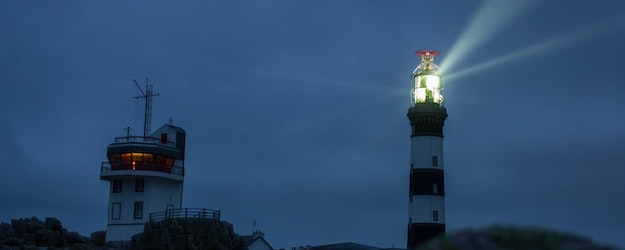
For centuries nautical explorers traveled the earth seeking new lands and civilizations. For weeks and months, they sailed following their maps by day and the stars by night. Often they would find themselves in the midst of horrific storms tossing them about. Seeking land for shelter required them to find a beacon of light to show them the way. The lighthouse beacon was their solace in the darkness and their guide by day.
For weeks now we have all been living our own journey of exploration. This one, however, has no maps or guides to follow. This journey comes in the midst of a global pandemic. This is our exploration of the COVID-19 coronavirus.
Who would have thought as we began our Lenten journey that it would become a journey like no other? The true penitential feel of this journey would take hold of us all. Social distancing would change life as we know it: keep six feet away from others, stay safe by staying home, wear a mask and gloves — all to protect us and stop the spread of this deadly virus.
Soon our lives would be affected in more substantial ways, as the number of infected people rose and the death toll climbed. Soon hospitals and nursing homes would be forced to close their doors. Family and friends would not be allowed to visit their sick loved ones. These new restrictions would heighten our fears and anxieties and lead many to depression.
The journey only became worse when the unexpected happened. Then came the announcement that publicly celebrated Masses were suspended until further notice. What? No Mass? No communion? What are we going to do? The journey was getting even more difficult! How would the darkness of this pandemic be transformed into a beacon of light?
Soon many parishes developed ways to communicate with the faithful through internet platforms such as Zoom, YouTube, and Facebook Live. Masses began to be streamed online for the faithful to participate, even if only “virtually.” Priests found innovative ways to hear confessions. By wearing masks and following social distancing, penitents had their sins forgiven.
What about the sick? How are they being cared for? This question became real to me during Holy Week. Having been trained as a hospital chaplain I knew the complexities this pandemic poses for our healthcare facilities. There are Catholic patients who need to receive the Sacrament of the Sick and families who need comforting in this most trying time.
It was Wednesday night of Holy Week and I had just finished my dinner and settled into what I thought would be a quiet night. The Lord had other plans! At seven o’clock the phone rang. A family needed their priest. Their 94-year-old mother was in the emergency room dying. I hurried to get ready and grabbed my little kit with everything I needed to anoint the sick, and raced to the emergency room. Upon arrival I was not allowed in. “Sorry, Father, but we’re locked down because there are patients with Covid-19. We can’t let you in.” Experience of hospital ministry prepared me for this situation, but how was I to administer the Sacrament to this dying lady? I urged the hospital staff to make an exception, but to no avail. Soon my only hope was to contact the hospital administrator. Having informed the administrator of my experience as a hospital chaplain, I was able to convince her to allow me access. On entering the hospital, I donned the requisite surgical gown, two face masks, and surgical gloves. As it turned out, the dying woman had COVID-19. As I was walking to the door of her room, I thought, This is for the glory of God so that His daughter may be ready to meet Him. I entered the room. A weak, burdened woman lay in bed wearing an oxygen mask, struggling to breathe. I leaned over and called her name. She opened her eyes. I told her who I was, wearing my stole over the gown to signal to her why I was there. She closed her eyes as I administered the Anointing of the Sick and bestowed the Apostolic Pardon. I blessed her and assured her that she was ready to meet the Lord.
On leaving the room, I found the emergency staff outside the door, huddled together and crying. “Why the tears?” I asked. One of them replied that they were so moved that I risked my life to minister to the dying woman. I reminded them that my priesthood is not my own: I share in the priesthood of Jesus Christ, and that is was He who ministered to her. I am but His instrument.
I left the hospital and found the patient’s family huddled in the parking lot. Even they were not allowed inside. I assured them their mom had received the sacraments. They told me that while I was inside the hospital they prayed to the Blessed Virgin under her title “Health of the Sick,” asking her to wrap me in her mantle of love as I ministered to their earthly mother.
On Holy Thursday morning, the day we celebrate the gift of the Priesthood, I received a call from the family informing me that their mom had been tested again for the COVID-19 virus, but this time there was no sign of it. The power of prayer and the hand of God had prevailed. At 5:30 on Easter morning, as the Dawn from on High appeared in His glorious Resurrection, the Lord called His 94-year-old disciple to Eternal Life!
In the midst of this darkness, may we experience within ourselves a renewal of love for and devotion to Jesus Christ the eternal High Priest, who through His humble priestly servants has made visible to us the true beacon of light, the light of Christ, Lumen Christi. Deo gratias! Thanks be to God!
Recent Comments